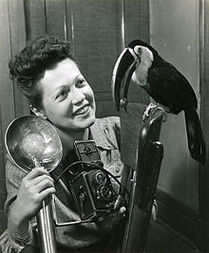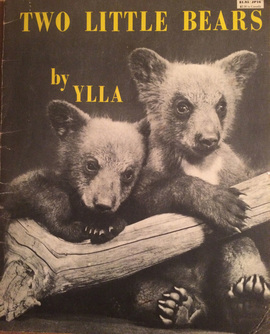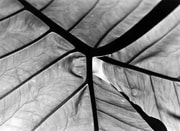The Two Little Bears, Yilla

“I wish that a fairy would wave a wand and transport me, for a month, into the animal world…I would think their thoughts, feel their feelings, fight their battles, and understand their language. I would live their joys and fears and their satisfactions…If this experience were possible to me, I think I would then be possessed of the beginnings of a real understanding of life.”
-Foreword to Yilla's 1950 book Animals
Approximately 100 years after photography was introduced, Yille (EE-la) became one of the first mass-appeal wild-animal photographers as well as a pioneer in the field. The earliest animal photographs (1800s) were taken of animals that remained still for the 10-20 minutes needed to capture an image. Thus animal photos were of taxidermy: a stuffed stag placed “naturally” by a stream - a mounted cat beside a ball of yarn. But as exposure times decreased and cameras became portable, living, moving animals were easier to photograph. Not only were cameras improving, but magazine publishing was evolving as well. The advent of high-speed printing and rapid distribution allowed the 1930s to usher in the Golden Age of Photojournalism. Life magazine and it’s many image-driven competitors hired photographers like Ylla to fill their pages. Her photographs were so widely circulated that they made Ylla a world-renown animal photographer of her day.
Born Camilla Koffler, Ylla began her career by showing in galleries and as a pet-portrait photographer. Eventually, her photographs were used for ads, slice-of-life magazine pieces, science books and children's picture books. She began with domesticated-animal subjects, advanced to zoo animals, and peaked with wild-animal shoots in Africa and India. “…having worked only in zoos, I had a strong desire to photograph animals in native surroundings, whole herds of them; and to record something different from the portrait of an isolated animal in cage.”
Ylla cared deeply for animals and must have found her job morally challenging at times: she was seriously injured when attacked by a zoo panda, she observed the hunting of elephants and big cats, and she witnessed the trapping of white rhinos and elephants by zoo collectors. But her last assignment presented her with a challenge far too great. She was in India as a personal guest of the Maharajah of Mysore and documented her time there for seven months. In the spring of 1955, while photographing a bullock (bull) cart race, she fell from the hood of a slow-moving Jeep. Ylla landed in the path of the race and was fatally injured; she was only in her 40s and at the very peak of her career.
Born Camilla Koffler, Ylla began her career by showing in galleries and as a pet-portrait photographer. Eventually, her photographs were used for ads, slice-of-life magazine pieces, science books and children's picture books. She began with domesticated-animal subjects, advanced to zoo animals, and peaked with wild-animal shoots in Africa and India. “…having worked only in zoos, I had a strong desire to photograph animals in native surroundings, whole herds of them; and to record something different from the portrait of an isolated animal in cage.”
Ylla cared deeply for animals and must have found her job morally challenging at times: she was seriously injured when attacked by a zoo panda, she observed the hunting of elephants and big cats, and she witnessed the trapping of white rhinos and elephants by zoo collectors. But her last assignment presented her with a challenge far too great. She was in India as a personal guest of the Maharajah of Mysore and documented her time there for seven months. In the spring of 1955, while photographing a bullock (bull) cart race, she fell from the hood of a slow-moving Jeep. Ylla landed in the path of the race and was fatally injured; she was only in her 40s and at the very peak of her career.
With regard to her work in today's world, she may have described it best, “…when color film will be faster, when cameras will be more highly perfected and lighter-weight telephoto lenses with larger apertures will be available, and when the animals on the reservations, will have learned to be less distrustful of man, then I, or someone else, will be able to make photographs far superior…” Yet, in her day, she was superior. Photography 1839-1937 was the Museum of Modern Art’s first photography exhibit and, at the time, the most comprehensive one ever held in the States. Its curator, Beaumont Newhall, was on a mission to have the medium accepted as an art form and to give the show's photographers, like Ylla, artist recognition. His exhibition was a huge success.
Over the course of her career, Ylla illustrated books with writers of science (L.S.B. Leakey and Julian Huxley) and those of literature (Jacques Prévert and Margaret Wise Brown to name a few.) The Two Little Bears, a picture book that she also penned, is a strong example of her work. In it, two cubs disobey their mother by going off alone to explore and play. When they lose their way, they rely on the help of forest and farm animals to reunite them with their mother. By the story's end, they are home, happy, and unlikely to disobey her in the future. Ylla, who as mentioned was attacked by a panda, seemed to have been undaunted by the size of the cubs' mother. Many shots were of this bear family in their natural environment. Some of the pictures of the cubs with other animals and on the cover, however, were of her own cubs that she bought, photographed and later gave to a zoo when they became too difficult to keep. There is little else to be found about her feelings relating to this decision.
The day Ylla died meant an end to her India journal entries. Her final thoughts regarding that cart race remain her own and a recent government ban on the races has been going back and forth in India's courts. Bull owners argue to keep their centuries-old tradition - one that brings much money; and animal groups want to permanently end the races they say are cruel and dangerous for the bulls. Had Ylla lived, after observing animals for decades, might she then have become a more active advocate for animal welfare? We will never know. But we do know that after witnessing an elephant hunt she wrote, “I do not understand the need in man to affirm himself heroically by killing.”
Two posthumously-released books with her photographs became their year's best sellers. There were comic books made of Ylla's life's story as well. However, her most lasting legacy may not be her photos alone. It may be the animal lovers her photos inspired, and Ylla's own life's tale - a life always in search of a "real understanding of life."
To learn more about Ylla, read her notes in her Animals in Africa and Animals in India books. Her godson, Pryor Dodge, shares much in this animalfair piece and on his own site as well.
Over the course of her career, Ylla illustrated books with writers of science (L.S.B. Leakey and Julian Huxley) and those of literature (Jacques Prévert and Margaret Wise Brown to name a few.) The Two Little Bears, a picture book that she also penned, is a strong example of her work. In it, two cubs disobey their mother by going off alone to explore and play. When they lose their way, they rely on the help of forest and farm animals to reunite them with their mother. By the story's end, they are home, happy, and unlikely to disobey her in the future. Ylla, who as mentioned was attacked by a panda, seemed to have been undaunted by the size of the cubs' mother. Many shots were of this bear family in their natural environment. Some of the pictures of the cubs with other animals and on the cover, however, were of her own cubs that she bought, photographed and later gave to a zoo when they became too difficult to keep. There is little else to be found about her feelings relating to this decision.
The day Ylla died meant an end to her India journal entries. Her final thoughts regarding that cart race remain her own and a recent government ban on the races has been going back and forth in India's courts. Bull owners argue to keep their centuries-old tradition - one that brings much money; and animal groups want to permanently end the races they say are cruel and dangerous for the bulls. Had Ylla lived, after observing animals for decades, might she then have become a more active advocate for animal welfare? We will never know. But we do know that after witnessing an elephant hunt she wrote, “I do not understand the need in man to affirm himself heroically by killing.”
Two posthumously-released books with her photographs became their year's best sellers. There were comic books made of Ylla's life's story as well. However, her most lasting legacy may not be her photos alone. It may be the animal lovers her photos inspired, and Ylla's own life's tale - a life always in search of a "real understanding of life."
To learn more about Ylla, read her notes in her Animals in Africa and Animals in India books. Her godson, Pryor Dodge, shares much in this animalfair piece and on his own site as well.


 RSS Feed
RSS Feed